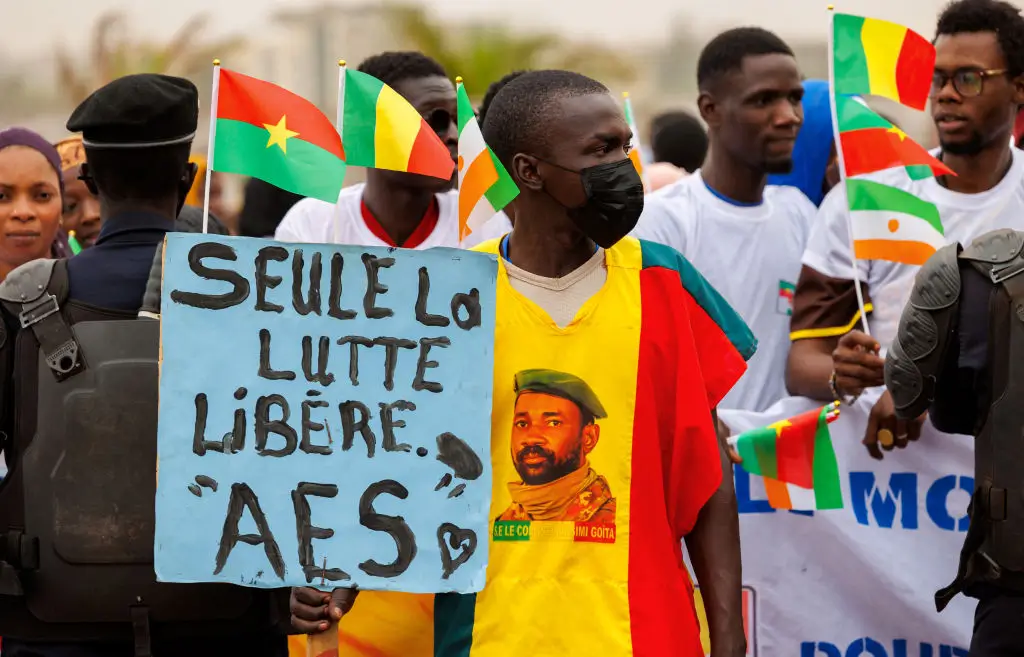In a swift move that has sent tremors through U.S. foreign relations in West Africa, Niger’s military junta has severed an agreement that allowed U.S. military personnel to operate in its country.
The announcement, made by junta spokesperson Col. Amadou Abdramane in a televised address on March 16, was made days after an official visit by U.S. Assistant Secretary of State Molly Phee and Gen. Michael E. Langley, U.S. head of military operations in Africa, to the capital city of Niamey.
“The American presence on the territory of the Republic of Niger is illegal,” Abdramane stated, adding that it “violates all the constitutional and democratic rules, which would require the sovereign people — notably through its elected officials — to be consulted on the installation of a foreign army on its territory.”

Additionally, the junta has decried the “condescending attitude accompanied by the threat of retaliation from the head of the American delegation towards the Nigerien government and people.”
Formerly, U.S. officials have voiced concerns about Niger’s political direction in internal and foreign affairs.
In a press briefing by White House Press Secretary Karine Jean-Pierre from March 18, the official touched upon the U.S. delegation’s visit to Niamey prior to the junta announcement and asserted that the U.S.’ goal was “to explore how we can chart a common path forward and our concerns about the lack of progress towards a democratic transition and operational consideration for us to maintain a long-term security partnership.”
The “democratic transition” possibly alludes to Niger’s internal politics and struggles with stabilizing its governmental affairs.
In a July 2023 military coup, Niger’s military removed democratically elected President Mohamed Bazoum from office and replaced him with Gen. Abdourahamane Tchiani, a previous commander of the Nigerien presidential guard. A generous donor of humanitarian aid and a longtime executor of anti-terrorism operations in Niger, the U.S. deemed the coup illegal.
Additionally, America has been observing Niger’s relations with other foreign powers and recent allies.
“U.S. officials expressed concern over Niger’s potential relationships with Russia and Iran,” stated Deputy Pentagon Press Secretary Sabrina Singh.
However, the scrutiny was ill-received by Niger’s new leaders, which became part of its rationale in the decision to sever military ties with the U.S. by asserting that “Niger regrets the intention of the American delegation to deny the sovereign Nigerien people the right to choose their partners and types of partnerships capable of truly helping them fight against terrorism.”
The junta also denounced what the U.S. delegation called a non-compliance of diplomatic protocol. Abdramane stated that the delegation broke diplomatic convention by not informing Niger of their composition, arrival date, or agenda.
It is estimated that between 600 to 1,000 US troops are based in Niger, a landlocked nation on Nigeria’s northern border that is also home to two U.S. bases. Of these, US Air Base 201 is a six-year-old, $110 million drone airbase near Agadez to monitor jihadist activities.
Among the initial responses by U.S. officials to the Niger announcement, State Department spokesperson Matthew Miller posted on X: “We are aware of the statement from the CNSP in Niger, which follows frank discussions at senior levels in Niamey this week about our concerns with the CNSP’s trajectory.” The CNSP is the Conseil national pour la sauvegarde de la patrie, Niger’s ruling military junta.
Days later, U.S. officials are reportedly seeking closed-door talks to see if they can keep some sort of security presence in Niger.
As for the trajectory in question, reports allude to Niger’s closening ties with Russia since July 2023’s military coup. Since then, high-ranking Russian defense officials have visited the nation, including Yunus-bek Yevkurov, Russia’s deputy defense minister, to meet with the head of the junta. Similarly, junta officials visited Moscow in January to pave the way for military cooperation, as per the Russian Defense Ministry.
U.S. officials have also been alarmed by the prospect of a secret agreement with Iran, which would possibly see Tehran access some of Niger’s vast uranium reserves.
This is not the first time Niger has severed its military ties with a Western nation in the hopes of asserting autonomy over its homeland security efforts. In December 2023, former colonial power France withdrew almost 1,500 troops at the request of the junta.
France, namely President Emmanuel Macron, who has been a longtime supporter of ousted Nigerian President Bazoum, vocally condemned the July 2023 coup. The condemnation prompted action by Niger’s new military rulers, who decided to make a drastic shift in strategy and ordered the French forces to leave Niger.
Hailed as a “new era” for Nigeriens, the decision was celebrated as a rupture from dependency on some Western powers. “Niger stands tall, and the security of our homeland will no longer depend on a foreign presence,” it allegedly proclaimed.
After years of military support, some experts are concerned that the removal of Western-allied troops could leave a vacuum in counterterrorism efforts in Niger and the Sahel.
Accordingly, foreign troops from France, Italy, Germany, the U.S., and the European Union were sent to lead counterterrorism efforts in the region and provide military training to its various nations as the latter underwent their political and governmental upheavals.
Yet, with new partnerships and allies on the horizon, Niger becomes one of several West African nations re-assessing their ties with Western powers.
Burkina Faso’s deterioration in relations with France has been incremental since 2022, culminating in the expulsion of the French embassy’s military attaché for “subversive activities.”
Mali also saw the gradual withdrawal of French troops following the military coup in Mali, as well as the arrival of controversial Russian mercenaries, the Wagner Group.
Junta-led Mali and Burkina Faso, along with Niger, also announced their departure from the Economic Community of West African States (Ecowas) at the beginning of the year, distancing themselves from alleged external power influence and “illegal, illegitimate and inhumane” sanctions that threaten to reverse their coups.
Following the exit from the 15-member coalition, the Sahelian states announced the Alliance of Sahel States (AES), which would provide “a path to sovereignty.” The AES would be represented by leaders from each country: Burkina Faso’s Ibrahim Traoré, Mali’s Assimi Goïta, and Niger’s Abdourahamane Tiani.


